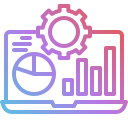
Harnessing Big Data to Enhance Customer Segmentation
In today’s data-driven world, businesses are redefining how they understand and engage with their customers. Harnessing big data enables organizations to delve deeper into customer behaviors, preferences, and emerging trends, paving the way for more precise customer segmentation. By leveraging vast amounts of data from various touchpoints, companies can create targeted experiences, foster loyalty, and drive sustainable growth. This page explores how big data transforms the art of customer segmentation, enabling brands to reach new levels of personalization and relevance.
The Evolution of Customer Segmentation with Big Data
More Than Demographics: Diving Deeper into Customer Data
Big data allows businesses to look beyond age, gender, or geography by incorporating behavioral, psychographic, and transactional insights. By aggregating and analyzing data from sources like social media, website interactions, purchase histories, and customer service engagements, brands can build a 360-degree profile of their customers. This depth of understanding supports the creation of tailored marketing messages and product offerings that resonate on an individual level, fostering greater loyalty and satisfaction.
Real-Time Segmentation: Adapting to Changing Behaviors
The traditional approach to segmentation was often static and updated infrequently, resulting in outdated or irrelevant groupings. Big data-powered tools now enable organizations to segment customers dynamically, adjusting to behavior in real time. As customers interact with brands through new channels or shift their buying habits, these platforms refine audience segments on the fly, ensuring that engagement strategies remain accurate and impactful.
Enhancing Personalization Strategies at Scale
Personalization has become a cornerstone of modern marketing, but achieving it at scale demands advanced data processing and analysis. By leveraging big data, businesses can create micro-segments based on very specific behaviors or preferences, allowing them to design highly personalized experiences. This not only increases the effectiveness of marketing campaigns but also maximizes return on investment by delivering the right message to the right customer at the perfect moment.
Leveraging Technology for Intelligent Segmentation
Advanced Analytics Platforms Enabling Smarter Decisions
Modern analytics platforms process enormous datasets at unprecedented speeds, allowing businesses to uncover meaningful customer segments based on nuanced patterns. These systems blend data from multiple sources and provide visualization tools to make interpretation straightforward for non-technical users. By using sophisticated algorithms to identify similarities and differences, companies can confidently make strategic decisions to target the right customer groups and maximize campaign effectiveness without being overwhelmed by data complexity.
Machine Learning: Uncovering Hidden Patterns
Machine learning algorithms excel at identifying correlations and patterns within vast and complex datasets that would elude human analysts. In the context of customer segmentation, these algorithms can predict future behaviors, group users based on evolving characteristics, and even suggest entirely new segmentations previously unconsidered. As the models learn from new data, they continually refine segmentation strategies, ensuring ongoing relevance and accuracy in rapidly changing markets.
Integrating AI for Predictive and Prescriptive Segmentation
Artificial intelligence extends segmentation capabilities by not only predicting future customer actions but also prescribing optimal engagement strategies. AI systems can simulate countless scenarios, weighing likely responses to various marketing tactics and suggesting the most effective approaches for each segment. This predictive and prescriptive power helps businesses proactively address customer needs, reduce churn, and anticipate emerging trends, all while delivering measurable improvements to performance metrics.

Driving Business Value Through Precision Targeting
Precision targeting means that every message, offer, or product recommendation a company delivers is rooted in a deep understanding of the recipient’s needs and preferences. Customers are more likely to engage with brands that anticipate their desires, resulting in higher open rates, click-throughs, and conversions. Over time, this relevance fosters a sense of trust and loyalty, as consumers feel truly understood and valued, not just targeted for business objectives.
